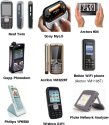Linux dominating VoIP devices?
Mar 20, 2007 — by LinuxDevices Staff — from the LinuxDevices Archive — views Trolltech says its development framework and software stack for mobile devices was selected by Skype as the preferred platform for Skype-certified VoIP (voice-over-IP) phones. Additionally, the Qtopia framework/stack has been used in about 40 VoIP devices, making it the “dominant Linux development platform for VoIP/WiFi… devices,” according to Trolltech.
Trolltech says its development framework and software stack for mobile devices was selected by Skype as the preferred platform for Skype-certified VoIP (voice-over-IP) phones. Additionally, the Qtopia framework/stack has been used in about 40 VoIP devices, making it the “dominant Linux development platform for VoIP/WiFi… devices,” according to Trolltech.
digg this story |
Trolltech CTO Benoit Schillings called Skype “the aircraft carrier of VoIP WiFi,” adding, “This is a nice victory for us. The deal means that we will work with Skype to be certain there is always a version of Qtopia that meets all the requirements of Skype-certified devices.”
| Qtopia design wins (Click each image for details) |
 Sony MyLO |
 Accton VM3228T |
 Wistron GW1 |
 Belkin WiFi phone (Accton VM1185T) |
 Neuf Twin |
 Gupp Phreedom |
 Philips VP6500 |
 Fluke Network Analyzer |
 Archos 604 |
Qtopia is Trolltech's development framework, graphics framework, and application stack for Linux-based mobile devices of all kinds. Initially popularized on Sharp's Zaurus PDA, Qtopia provides a lighter, faster GUI than Linux's traditional X Window system — important considerations for resource-constrained battery-powered mobile devices. thousands of commercial and open source Qtopia applications have appeared through the years.
As the PDA market began ceding ground to the mobile phone market, Trolltech adapted Qtopia to mobile phones. However, the company never specifically pursued VoIP phones, according to Schillings. He explained, “We never before tried to [make a version of Qtopia] just for VoIP phones. But now, we are a major player in this market. It shows how Qtopia is device-agnostic. For example, most of development done on GreenPhone [story] also makes sense for a VoIP environment.”
Schillings confirmed that Trolltech's relationship with Skype began many years ago, when Skype chose to develop its flagship soft-phone on top of Trolltech's Qt cross-platform development framework. Perhaps best-known in the Linux world for serving as the basis of the KDE (KDE desktop environment), Qt is actually a cross-platform development environment aimed at enabling one source code base to be built into binaries for multiple platforms. Skype's choice of Qt enabled it to deliver both Windows CE and Linux Skype clients very soon after releasing desktop Windows and Mac versions.
Schillings noted that Trolltech's deal with Skype is not exclusive, and that Qtopia will continue to go into other proprietary VoIP phones, as well as standards-based SIP VoIP phones. He said, “In the case of WiFi markets, Skype is the big one, but Trolltech is also working with Fonav, which makes a VoIP phone that is compatible with Google's GTalk, and we are in 40 other WiFi devices, with a number of additional ones in the works.”
Trolltech plans to display many of its 40 VoIP phone wins at the VONM trade show this week in San Jose. These include:
- Sony MyLO a personal communicator
- Accton VM1185T dual mode mobile phone
- Wistron GSW mobile phone resold by companies such as Belkin and Neuf (a French mobile virtual network operator)
- Gupp Technologies Phreedom available in 2007 which uses the Qtopia-based Convergent Linux Platform from a la Mobile
- Leadtek IP broadband videophone, XTP 8830
- Panasonic KX-WP1050 mobile phone, a Skype enabled device
- Philips WiFi Videophone VP6500
- Quanta YE7 IP videophone
- Fluke Network EtherScope and EtherScope Series II Network Assistant
- Archos 604 and Archos 704 Wi-Fi Portable Media Players
By 2010, VoIP shipment volumes will reach 46 million units for wireline devices and 200 million units in VoIP over WiFi, according to ABI Research figures cited by Trolltech. Skype was the first company to popularize VoIP softphones, and for many its name is still synonymous with VoIP. However, carrier VoIP services such as Vonage, Verizon VoiceWing, and AT&T CallVantage in the U.S., and European offerings from BT, Wanadoo, and AOL are increasingly popular, numerous reports suggest. Research from Point Topic in 2006 suggested that Skype had just under 15 percent of the market, second to Vonage's nearly 22 percent.
Asked for an opinion about whether proprietary VoIP clients like Skype can remain competitive with standards-based open source offerings, Schillings said, “Skype's protocols are closed, but continuously evolving. Some of the open standards groups will try to move faster, to get very good video integration, for example. So there's an evolving battlefield there. But right now, what I see is the volume of customers that Skype has.”
Various reports spotted online suggest that Skype has between 5 million and 9 million regular customers, although Skype client software has been downloaded many, many millions of times.
Trolltech is publicly traded on the Oslo Stock Exchange. During its IPO last July, the company raised about $19 million, with shares selling for as much as 19 Norwegian Kroners (approx. $3). Prior to the announcement of this news, shares were trading between 11 and 12 NOKs ($1.63 to $1.96) per share.
Trolltech has traditionally declined to reveal its product pricing structures, demurring that its royalty rates are too volume-dependent to be meaningful out of context.
This article was originally published on LinuxDevices.com and has been donated to the open source community by QuinStreet Inc. Please visit LinuxToday.com for up-to-date news and articles about Linux and open source.